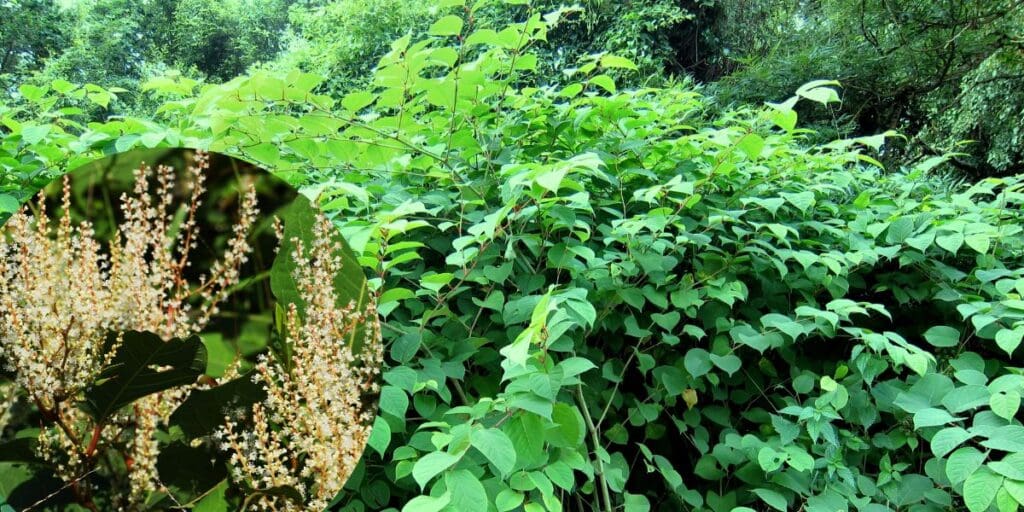As the summer arrives, housebuyers in Wales are being warned about the spread of Japanese Knotweed as it could put a stop to selling due to its costly nature. Wales has the biggest concentration of Japanese Knotweed in the UK with areas in South Wales being affected the worst.
Experts at Compare My Move have put together a quick guide on what steps you should take if you fear a home you are buying or selling has a Japanese Knotweed infestation, and how it will affect the process.
What is Japanese Knotweed?
Japanese Knotweed is an invasive plant that can cause extensive property damage if not removed professionally and carefully. The plant affects approximately 5% of all homes in the UK but Wales is notorious for having a strong concentration of Japanese Knotweed, according to the Japanese Knotweed Heatmap and this percentage is estimated to be much higher. Swansea, Cardiff, the South Wales Valleys, Newport, Aberystwyth, the Eryri National Park and West Dyfed are just some of the highly affected areas.
Japanese Knotweed grows incredibly fast in the summer, at 10cm a day, and it is illegal to leave it untreated and to allow it to spread to other properties, coming with a £2,500fine if you fail to control the plant.
Can I Sell a House With Japanese Knotweed?
You can sell a house with Japanese Knotweed, it isn’t illegal to have Japanese Knotweed on your property – however, you must disclose that the house you are selling has Japanese Knotweed present. If you deliberately conceal or try to cover up knotweed on your property when selling you may face legal action.
Will Japanese Knotweed Impact My House Price?
Having Japanese Knotweed on your property can reduce the value of your house by 15%, due to both the damage it can cause and the cost of treating and ultimately getting rid of Japanese Knotweed. It can cost anywhere from a few hundred pounds to over £15,000 to get rid of depending on:
-
The size of the area affected
-
The extent of the growth
-
The location
-
Type of treatment required
On top of that, you could have the costs of repairs to any structure that the Japanese Knotweed has affected so far. These costs will obviously make buyers reluctant to buy a house with Japanese Knotweed at full price and could cause the sale to fall through altogether.
How Do I Know if a House I’m Buying Has Japanese Knotweed?
Japanese Knotweed has a few distinctive features, that allow you to identify it. These include:
-
Tall, hollow and green cane/bamboo-like stems
-
Shovel-shaped green leaves
-
Small creamy white flowers through the summer
-
Roots that are dark brown on the outside and orange/yellow inside
A surveyor can also tell you if Japanese Knotweed is present around the home and grounds which is especially handy if the Japanese Knotweed is hard to detect. They will also inform you if it is on neighbouring land or if you have a risk of it invading your property in the future.
According to Environet; “Residential surveyors have a duty of care to both the homebuyer and the mortgage lender to identify Japanese knotweed during a survey, even if the seller has attempted to hide it.”
Both the Level 2 HomeBuyers Survey and Level 3 Building Survey will highlight any presence of Japanese Knotweed. In Scotland, the Single Survey is approximately the same as the Level 2 survey. This will also flag any knotweed concerns.
Can I Get a Mortgage on a House With Japanese Knotweed?
Mortgage lenders are reluctant to lend on a property that has Japanese Knotweed because their investment could easily be at risk if the Knotweed goes untreated and lowers the house price even more.
It isn’t impossible to get a mortgage on a house with Japanese Knotweed, allowances may be made if you have an insured treatment plan. Most knotweed treatment companies will offer an insurance-backed guarantee that will re-treat any growth within a certain period, putting your and your lender’s minds at ease on the impact of the knotweed in the future.
Even with an insured treatment plan in place, there is no guarantee that a mortgage lender will be happy to lend and this is entirely dependant on the individual circumstances.

